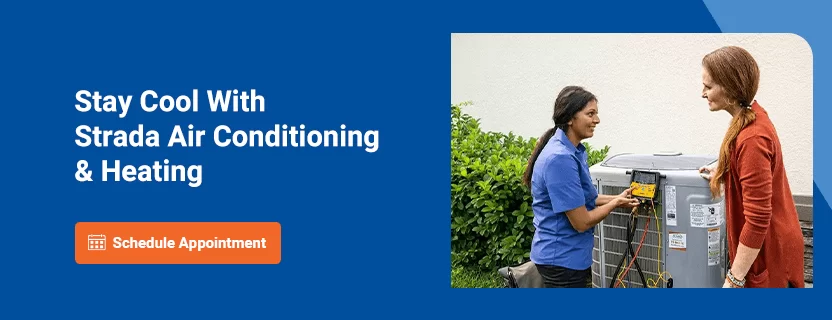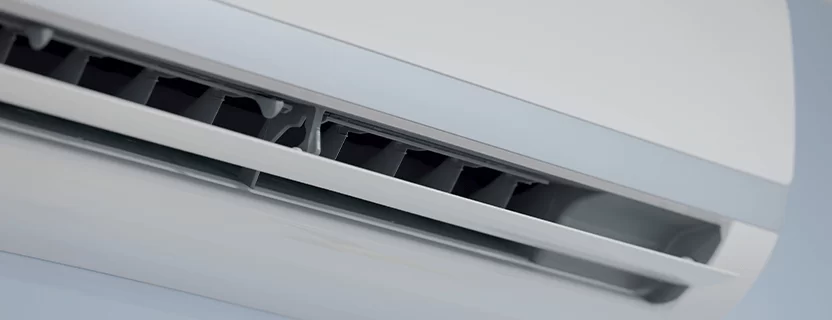
When it’s hot outside, the last thing you want to deal with is a broken air conditioner. Sometimes, the reason your AC is not working in your house is a relatively simple one you can fix by yourself. Other times, you’ll have to call in a professional. Understanding why your air conditioner is not working can help you get the necessary services to stay comfortable and cool at home.
Understanding why an air conditioner is not workingcan help you identify issues faster and communicate with technicians more effectively. You’ll know when to call for service and what to prepare for a stress-free AC checkup. Here are some of the most common reasons an AC stops working:
Your air conditioner needs regular maintenance to keep it working effectively. Neglecting maintenance tasks can lead to problems ranging from reduced efficiency to complete breakdowns. Routine tasks like cleaning or replacing air filters, checking for loose electrical connections and lubricating moving parts are crucial to prevent issues caused by neglect.
Routine maintenance can help extend your air conditioner’s life span. Over time, small wear-and-tear issues are inevitable — regular maintenance helps catch these issues and correct them early. Without maintenance, small issues sit unchecked and become larger, more expensive problems that are much harder to deal with. If your AC isn’t getting routine care, it can begin to break down, potentially leaving you without a cooling system when you need it most.
Refrigerant is a core air conditioner component. It transfers heat and cooling through your home, allowing the AC to work as intended. If you’re having air conditioner issues, the refrigerant might be why your AC is not working. Low refrigerant levels due to leaks can cause your AC to struggle and lead to inadequate cooling.
Addressing refrigerant issues involves identifying leaks, repairing them and recharging the system to the correct level. A trained technician should perform all of these steps, so contact a professional if you think refrigerant is the source of your AC issue.
Electrical problems are the culprit behind a wide range of reasonsyour air conditioner may be malfunctioning. Some common potential electrical issues include faulty wiring, capacitor problems or a malfunctioning thermostat. These issues can lead to your air conditioner not starting, cycling irregularly or being unable to produce adequate cooling. If your air conditioner works sometimes and not others, it’s probably an electrical issue.
It’s essential to ensure your electrical components are in good condition to maintain your AC’s efficiency and durability. Regularly inspecting and servicing electrical components and connections is a great preventative measure to keep your system reliable.
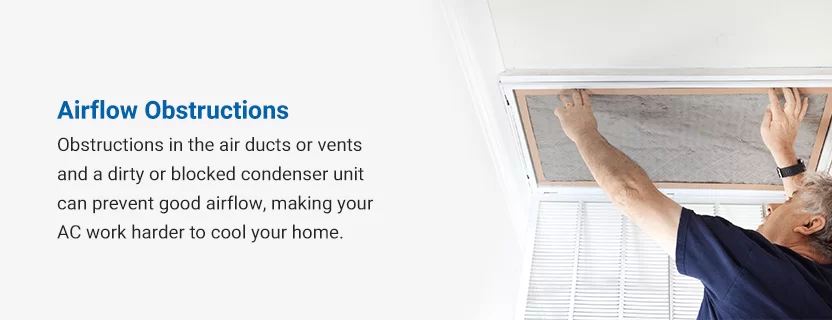
Adequate airflow is crucial for a properly functioning air conditioner. Obstructions in the air ducts or vents and a dirty or blocked condenser unit can prevent good airflow, making your AC work harder to cool your home. Regular vent cleaning, clearing obstructions and removing debris from the condenser can help maintain proper airflow. With unrestricted airflow, your air conditioner can cool your home more efficiently, reducing energy consumption and increasing its life span.
Your thermostat acts as the control center for your air conditioner. Malfunctions in the thermostat can lead to erratic temperature readings and cause your AC to cycle irregularly or not cool as desired. Calibrating or replacing a malfunctioning thermostat can often resolve these issues and ensure your AC responds accurately to your cooling needs. Modern programmable thermostats can enhance comfort and energy efficiency and allow precise control over your cooling system, making them an excellent investment if you don’t already have one.
Evaporator coils are responsible for absorbing heat from your indoor air. Over time, dust, dirt and other airborne particles can accumulate on the coil’s surface and form a layer of grime that prevents heat transfer. As a result, your AC has to work harder to cool your home, which can lead to decreased cooling capacity and even system failure. Routine maintenance, including cleaning or professional servicing, helps these coils remain clean and effective.
You might also have a frozen evaporator coil on your hands. Frozen evaporator coils occur when the coil gets excessively cold and ice forms on its surface. This ice obstructs airflow, leading to a decrease in cooling capacity. Causes of frozen evaporator coils include low refrigerant levels, insufficient airflow or dirt accumulation. If you have this issue, turn your AC off and let the coil thaw. Once it’s thawed, you can address the underlying issues.
The compressor is another critical AC component. It’s responsible for pressurizing the refrigerant, transforming it from a low-pressure gas into a high-pressure liquid and circulating it through the system. When the compressor encounters problems, it can significantly impact your AC’s performance. Compressor issues can be caused by electrical problems, refrigerant leaks or overheating — repairing or replacing the compressor is a complex task best handled by a professional AC technician due to the precise calibration required to restore your AC’s cooling capabilities.
Air conditioners produce condensation as they cool your home’s air. This moisture requires efficient drainage to prevent issues. Excess water accumulates in your air conditioner when the condensate drain becomes clogged, obstructed or damaged. This moisture accumulation can lead to water leaks, disrupting your AC’s function and even damaging your home. Regular inspections and cleanings can efficiently remove moisture, preventing unwanted water-related problems.
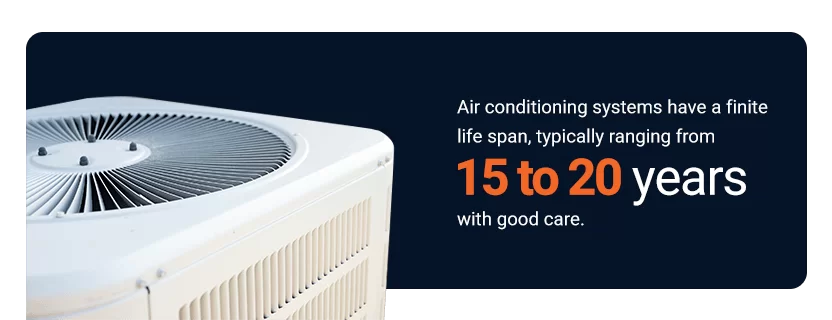
Sometimes, the most straightforward explanation for why your AC unit is not working is excessive age and wear. Air conditioning systems have a finite life span, typically ranging from 15 to 20 years with good care. As your AC ages, its components naturally experience wear and tear, becoming less efficient and more prone to breakdowns.
If your air conditioner is approaching the upper end of this age range and experiencing problems, it might be more cost-effective to consider replacing it with a newer, more energy-efficient model. Modern AC units offer improved efficiency, better cooling performance and reduced energy consumption.
Now that you know the common reasons for AC failure, it’s time to identify why your air conditioner is not working. You live with your AC unit every day, and you know it well — if you spot something unusual, knowing how to diagnose an issue can help you communicate with your technician more effectively. If the tech gets good information, they’ll be better prepared on the job and can work through the issue more quickly.
Let’s look at some of the ways you can potentially diagnose issues with your air conditioner:
If you’ve looked at all the potential reasons an air conditioner might stop working and still can’t find a solution, it’s time to call a professional. Doing more than basic maintenance on your air conditioner is not always recommended — AC units have complex and delicate interior components that require expert hands to ensure everything works properly. When your AC isn’t working, you need to keep these factors in mind.
Find My Nearest Strada LocationWhile DIY troubleshooting can address some air conditioner issues, certain signs indicate the need for professional help. These include refrigerant leaks, electrical problems, persistent strange sounds and major airflow obstructions. If you’re having regular AC problems, you need a professional to take a look. Ignoring these issues can lead to more extensive and costly damage, making it crucial to bring in a qualified AC technician.
Timely repairs are vital to prevent minor issues from evolving into major problems. Delaying repairs can lead to reduced cooling efficiency, increased energy bills and even complete system breakdowns. It’s often more cost-effective to address problems early and contact a technician right away once you begin noticing problems. They’ll inspect your system and make sure everything is working as needed.
Selecting the right technician is critical for a successful repair. Look for experienced, insured technicians with good reviews and open communication policies. You want to make sure the professional you choose has ample air conditioning experience so you can make sure your system is getting the best possible service. Check their site for reviews — customers with great experiences will have lots to say.
Once you’ve found a reputable service, feel free to request estimates before proceeding with any repair work. A reputable technician will diagnose the issue accurately and provide efficient solutions to get your unit back in working order.
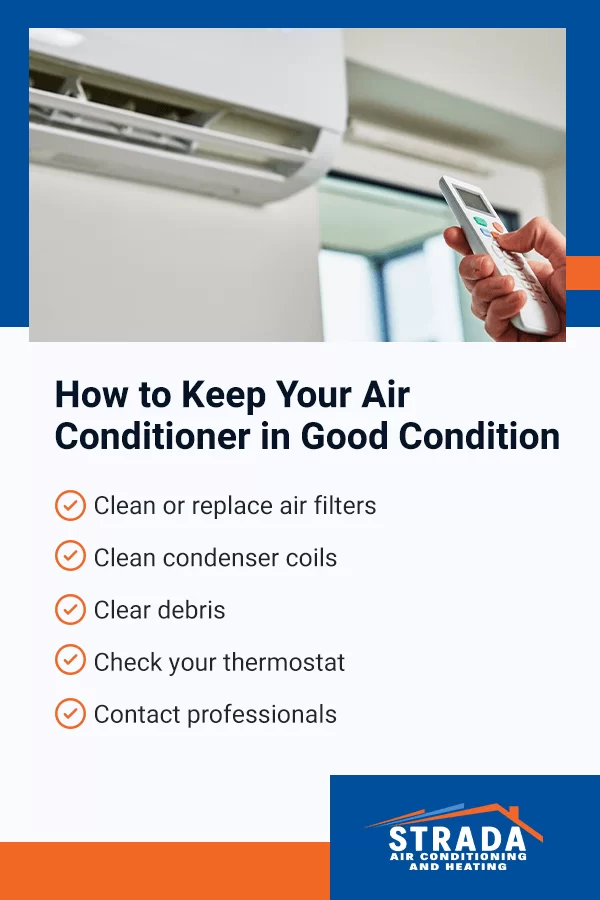
After you’ve called in professionals to get your AC running again, you need to continue with maintenance to ensure these problems don’t reoccur. Regular maintenance is the backbone of a healthy air conditioning system. It helps catch minor issues before they become significant and ensures your AC functions at peak efficiency. It can also help extend your unit’s life span, reducing the need for costly repairs and replacements.
Consistent maintenance saves you money on energy bills and promotes indoor air quality, keeping your home comfortable during the hottest months. Here are some steps you can take to keep your air conditioner in good condition:
When it comes to keeping your air conditioner running at its best, you can count on the experts at Strada Air Conditioning & Heating. Our seasoned professionals are dedicated to providing you with trusted air conditioning services for your home. We understand how frustrating a broken AC can be and want to ensure you get the support you need every time. With regular air filter replacements from Strada Services, you can expect convenient, scheduled deliveries to ensure your maintenance is as easy as possible.
The Strada Air Conditioning & Heating team has what it takes to ensure your air conditioner runs smoothly all year. Schedule an appointment with us online to get started today!
